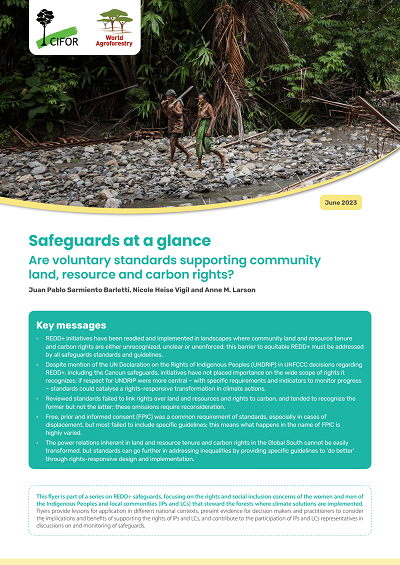Key messages
- REDD+ initiatives have been readied and implemented in landscapes where community land and resource tenure and carbon rights are either unrecognized, unclear or unenforced; this barrier to equitable REDD+ must be addressed by all safeguards standards and guidelines.
- Despite mention of the UN Declaration on the Rights of Indigenous Peoples (UNDRIP) in UNFCCC decisions regarding REDD+, including the Cancun safeguards, initiatives have not placed importance on the wide scope of rights it recognizes; if respect for UNDRIP were more central – with specific requirements and indicators to monitor progress – standards could catalyse a rights-responsive transformation in climate actions.
- Reviewed standards failed to link rights over land and resources and rights to carbon, and tended to recognize the former but not the latter; these omissions require reconsideration.
- Free, prior and informed consent (FPIC) was a common requirement of standards, especially in cases of displacement, but most failed to include specific guidelines; this means what happens in the name of FPIC is highly varied.
- The power relations inherent in land and resource tenure and carbon rights in the Global South cannot be easily transformed, but standards can go further in addressing inequalities by providing specific guidelines to ‘do better’ through rights-responsive design and implementation.
Download:
Año de publicación
2023
Autores
Sarmiento Barletti, J.P.; Heise Vigil, N.; Larson, A.M.
Idioma
English
Palabras clave
indigenous people, local community, sustainable development, development policy, standards, community forestry, climate change, mitigation



















